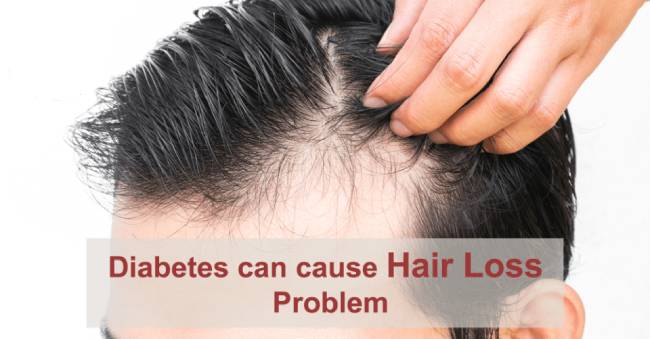Table Of Content

A buildup of sugar in the blood can damage blood vessels and organs throughout the body. Healthy blood vessels are necessary for transporting oxygen and nutrients to each part of the body, including the hair follicles. Platelet-rich plasma (PRP) is a treatment in which your own blood is collected, refined, and injected directly into the skin along the scalp. This refined blood is especially rich in platelets, which secrete growth factors that can act directly on hair follicles, stimulating hair growth. Also, an increased infection rate is a red flag for impending hair loss.

Controlling Blood Sugar Levels

Type 2 diabetes, on the other hand, is mainly characterized by insulin resistance and elevated blood sugar levels. In this case, hair loss can be attributed to stress and hormonal imbalances caused by the chronic condition. Uncontrolled blood sugar, stress, and hormone imbalances can reduce the flow of oxygen and nutrients to the hair follicles, ultimately causing hair fall and loss.
Healthcanal Newsletter
Try not to tug at your hair while you brush it, and avoid brushing it while it is wet. Growing hair after experiencing hair loss due to diabetes is possible, but it can take longer than you might wish. Hair growth isn't linear, and it actually comes and goes in three distinct phases. Learn more about the signs and symptoms of diabetes, how it can impact hair loss, and some strategies for preventing hair loss with diabetes.
When to Call Your Healthcare Provider
This treatment option is promising, but it can cost several thousand dollars and isn't usually covered by insurance. Abnormal functioning of the immune system causes it to produce white blood cells that attack the body’s own tissues. High cortisol levels can also disrupt hair growth and cause hair loss.
Concerns About Ozempic and Wegovy Hair Loss Rising Among Consumers - AboutLawsuits.com
Concerns About Ozempic and Wegovy Hair Loss Rising Among Consumers.
Posted: Sat, 05 Aug 2023 18:53:16 GMT [source]
Diabetes-induced iron deficiency
Tight hairstyles and wearing tight hats can damage hair follicles and cause hair loss, particularly in those with type 2 diabetes. Opt for looser hairstyles and avoid harsh chemicals and heat-styling tools to prevent damage. To prevent hair loss in diabetics, it's essential to manage blood sugar, reduce stress, and practice gentle hair care.
It's a tough pill to swallow, but you're definitely not alone in this. If you have any medical questions or concerns, please talk to your healthcare provider. The articles on Health Guide are underpinned by peer-reviewed research and information drawn from medical societies and governmental agencies. However, they are not a substitute for professional medical advice, diagnosis, or treatment. Blood sugar plays a starring role in your body’s functions by serving as its primary energy source. However, when blood sugar levels get too high, problems can arise in nearly all of your body systems—including blood circulation.
Haircare: Consuming Excess Sugar Can Cause Hair Loss; Follow These Tips To Reduce Hair Loss From High Blood Sugar Levels - NDTV
Haircare: Consuming Excess Sugar Can Cause Hair Loss; Follow These Tips To Reduce Hair Loss From High Blood Sugar Levels.
Posted: Thu, 09 Feb 2023 08:00:00 GMT [source]
With a proper diet, your hair will grow stronger and healthier, resulting in locks that are more resistant to other factors that can trigger hair loss. Consistent diabetic nerve damage will affect the autonomic nervous system, which controls digestion and bowel movements. Diabetes can cause dizziness with extreme blood sugar levels—both high and low.
Metformin
Diabetes is not just a condition of disrupted insulin response or elevated glucose levels; it also affects many other activities in the body. Because blood sugar is the fuel for the entire body, changes in how your body can use this fuel can lead to many physical symptoms. Diabetes can also affect blood vessels, which is how the body delivers nutrients to cells, tissues, and organs. By contrast, scarring alopecia, another autoimmune disease that causes hair loss, is often accompanied by itchiness, tenderness and scaling of the scalp. Scarring alopecia is the most devastating type of hair loss, Mirmirani says, because it permanently destroys the hair follicles.
vitamin D
They can identify the underlying cause of hair loss and recommend suitable treatment options. Smoking can negatively affect many aspects of health, including hair health. This is because the harmful chemicals in cigarettes can affect hair follicles. Here, dermatologists share what you need to know about alopecia, including possible causes, treatment options and what you can do to prevent more hair loss. CCCA and LPP fall under the umbrella of lymphocytic scarring alopecia. The telltale signs of these conditions are chronic inflammation of the scalp and the scarring of hair follicles, which can result in irreversible hair loss, Agbai notes.
Treatment options for hair loss include topical medications, biotin, and lifestyle changes. However, the results of most of these treatments are rarely long-term. Around 1 in 10 Americans live with type 2 diabetes, a disease in which levels of blood glucose, or blood sugar, are too high.
A new haircut or hairstyle could help, as well as clip-in extensions and wiglets. Here are different ways in which this chronic condition affects hair. While hair loss is a natural part of aging (for both men and women), you’ll probably know when your hair loss has accelerated to an unexpected level. Hair loss is a common condition affecting millions of people each year. If the hair loss covers a large area of your scalp, you may want to temporarily cover it with a wig or hairpiece. Hair thinning and hair loss can come with a degree of shame because hair contributes to our feelings of beauty, femininity, and masculinity.
Alopecia areata is an autoimmune condition that is characterized by “round patches of hair loss on the scalp,” although it can occur elsewhere on the body, Agbai says. While the exact reason for this type of hair loss is unknown, it is generally understood that “the immune system mistakenly attacks hair follicles, leading to hair loss,” she adds. People experiencing female pattern baldness may also notice a general thinning of hair on the top of your head, but hair loss typically won’t occur on the front of your scalp, per Harvard Health. Baldness is often hereditary, and is activated by a shift in your hormones. If you notice that your hair is growing slower than the usual rate or more hair is in your brush or drain, speak with your doctor about potential causes of lost hair and hair loss treatment options. They may recommend adjusting your medications or addressing underlying hormonal imbalances.
Finasteride (Propecia) is a prescription medication for males who experience hair loss. It is available in pill form, and a person needs to take it on an ongoing basis to see significant results. People with PCOS might also experience hair loss due to high levels of sugar in the blood. People with type 2 diabetes often have insulin resistance, which means that the cells in their body do not respond to insulin appropriately. Doctors used clinical tests to rule out any systemic or skin diseases that might be contributing to hair loss. The authors of the report concluded that there was a possible association between the medication and hair loss.


No comments:
Post a Comment